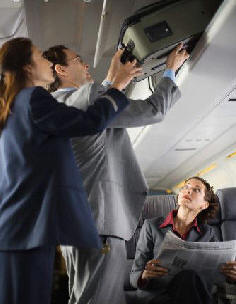 |
|
|
|
|
|
|||
|
To Add Insult To Injury Airlines Charging More In Fees |
||||
 |
April 7, 2010 - Spirit Airlines has reported that it will soon charge extra for carry on bags. Ryanair has stated they are looking into charging passengers to use the bathroom on their aircraft. Other airlines are placing vending machines on their aircraft and subjecting consumers to ads on the back of aircraft seats. While none of this makes any sense, consumers are told by the airlines such measures will result in lower airfares. Spirit Airlines reported passengers can only carry onboard one free carry on and that carry on must fit under the passenger seat. If the carry on does not fit under the seat the passenger will be charged for it. Any carry on placed in the overhead bins will result in an additional charge to the passenger of $20 to $45. Airline officials are calling it, "bring less pay less." There surely are a number of appropriate ways to reduce costs to increase revenue, which can be used to pay fair wages and provide a safe and reasonable airfare experience to the traveling public. Such savings could be realized through lower CEO compensation packages, performing required maintenance to reduce the number of regulatory fines, and using common sense approaches to passenger travel which would lead to less lawsuits and fines. Consumer advocates have called this good corporate citizenship. Lets get our house in order first. |
|||
|
In January 2007, Barney Frank introduced Bill, H.R. 1257 in the
House of Representatives, called "Shareholder Vote on Executive
Compensation Act" that would give shareholders more oversight into
executive pay packages. Although the bill would not set pay limits, the
bill would make sure that shareholders had a voice in approving company
executive pay practices.
At the time President George W. Bush voiced his concern over executive
compensation. However, the White House stated that it, "does not believe
that Congress should mandate the process by which executive compensation
is approved," hence the bill did not pass. After 20 months of restructuring Northwest Airlines CEO, Doug Steenland, exited bankruptcy with a big pay package worth $26.6 million. However, Northwest workers bore the brunt of the restructuring with a $1.4 billion a year cut in labor expenses resulting in a lost of wages of 20 and 40 percent for pilots and flight attendants.
Former American Airlines CEO, Donald J. Carty, had informed his workers
that the company would need to cut salaries if the airline was to
survive, the workers agreed. Within days of the agreement, union leaders
learned that AMR executives were keeping $41 million in retention
bonuses for themselves. Carty was forced to resign. |
||||
|
In 2008, Continental Airlines CEO, Lawrence W. Kellner, received
$5,757,527 in total compensation, Delta Airlines CEO, Richard H.
Anderson, received $5,888,812 in total compensation, and US
Airways CEO, W. Douglas Parker, received $5,426,702 in total
compensation. Each of these CEO?s made more than 133 times the average
worker's pay.
In addition, the airlines informed the traveling public they would have
to pay for any luggage placed into the belly of the aircraft and those
free soft drinks and peanuts had to go. In September 2009, the
Department of Transportation fined Spirit Airlines $375,000 for a number
of consumer rights abuses.
In February 2010, the Federal Aviation Administration (FAA) proposed a
$2.9 million civil penalty against
American Airlines and American Eagle for operating more than 1,000
flights using airplanes that required maintenance.
In August 2009, a Continental Airlines Flight 2816 sat on the tarmac at As a result
congress passed legislation, the ?Tarmac Rule,? that that would prevent
passengers from ever again having to sit out on the tarmac for more than
three hours. Continental Airlines Chief Executive, Jeff Smisek, called
DOT?s new consumer protection Tarmac Rule "stupid.? What's next, charging passengers $10 for every pound they weigh over 170 pounds? |
| ?AvStop
Online Magazine
Contact
Us
Return To News
|
|
